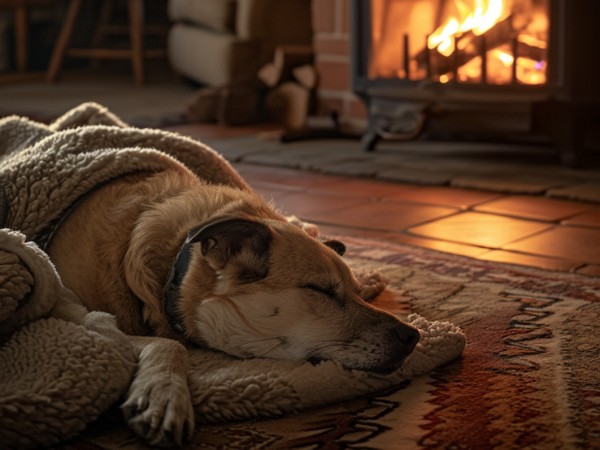Can dogs get colds?
Dogs can't catch the common cold from humans, but they can experience illnesses caused by dog-specific viruses like canine adenovirus and parainfluenza virus, or bacteria like Bordetella bronchiseptica. These pathogens can cause symptoms in dogs that are similar to a human cold, such as sneezing, coughing, and feeling tired.
It's important to understand that while dogs can't catch human colds, the illnesses they do get, often referred to as “colds”, are specific diseases such as kennel cough or canine influenza. These diseases can't spread to humans. Vaccinations against certain canine viruses are recommended to protect your dog.
Brief summary
- Dogs can't catch human colds but can get similar symptoms from canine viruses and bacteria
- Dogs often catch colds in social settings and living in poorly ventilated or crowded conditions may lower their resistance
- See a vet if cold symptoms persist or worsen, or if the dog has breathing troubles or a persistent cough
- Prevent colds with regular vaccinations and managing their interactions with other dogs
How do dogs get colds?
Dogs can catch illnesses from viral infections like the canine parainfluenza virus and the canine adenovirus. These viruses are often highly contagious so are often spread in places where dogs congregate.
Bacterial infections, such as Bordetella bronchiseptica, are also a common cause. A dog’s environment can affect their likelihood of catching disease, as conditions such as damp, poor ventilation, overcrowding and poor hygiene can encourage spread.
Other illnesses, such as diabetes, can also weaken your dog’s immune system, making them more prone to infections.
Dog cold symptoms
.png)
Common signs that your dog may have a cold-type illness are:
- Sneezing
- Coughing
- Runny nose
- Lethargy
- Reduced appetite
These are all signs of illnesses like kennel cough, flu, or even more serious conditions. Not every dog will show all these symptoms. If your dog has mild symptoms only, keep them quiet, tempt them to eat, and monitor them closely for any worsening signs.
Remember, preventing contact with other dogs during illness is important to avoid spreading the infection.
When to see your vet about a dog cold
A cold in a dog usually only lasts a few days. If your dog's symptoms don't improve within this time, or if they get worse, it's important to see the vet. You should also contact your vet if:
- Your dog is finding it harder to breathe. This may show as breathing with more effort, panting when not hot or exercising, making wheezing sounds, or breathing rapidly
- Your dog is much less active than usual or isn't interested in food
- Your dog has a cough that won't go away
- Your dog feels hotter than usual or is shivering
- Green, yellow, or smelly discharge coming from your dog’s nose or eyes
- Your dog is being sick or has diarrhoea, especially if it's for more than a day
Dog cold treatment
Your vet will diagnose the issue based on your dog’s history and symptoms, a medical examination, and possibly some diagnostic tests like blood tests or swabs.
If the illness is caused by bacteria, the vet may prescribe antibiotics. While there's no direct cure for viral infections, the vet might prescribe medications to manage symptoms, such as cough suppressants or anti-inflammatories. If your dog is congested, you may be advised to try a humidifier or nebuliser.
Treatment at home should include rest, ensuring your dog drinks plenty of water, and keeping them warm and comfortable. You should also make sure your dog continues to eat.
How to prevent your dog from catching a cold
Regular visits to the vet for vaccinations and check-ups are always recommended. Vaccinations can protect your dog from viruses and bacteria that cause respiratory infections, such as kennel cough. Regular check-ups also help catch any health issues early, before they become serious. Members of Pet Health Club get vaccinations and six-monthly health checks as part of their subscription.
Keeping your dog warm and dry, especially after walks in cold weather, helps maintain their health. Also, be cautious about your dog's interaction with other dogs, especially if an illness is going around.

FAQs
Can dogs get colds from humans?
No, dogs can't catch colds from humans. The viruses that cause colds in humans differ from those that affect dogs. So, you don't need to worry about passing it to your dog if you have a cold.
Can I give my dog human cold medicine?
No, you should never give your dog human cold medicine. Many ingredients in human medications are harmful to dogs, including (but not limited to):
- Paracetamol
- Ibuprofen
- Cough medicine
- Cough drops that contain xylitol
- Sudafed
Take your dog to your vet immediately if you think they have ingested any human medication.
Is it okay to walk my dog if they have a cold?
You can still walk your dog if they wish to go out, but keep the walks shorter and less strenuous. If your dog is lethargic or showing signs of distress, it might be better to avoid walks and consult a vet.
How can I prevent my dog from getting a cold?
Keep up with regular vaccinations, provide a balanced diet, and ensure they have a warm, dry place to sleep. Also, be cautious about their interaction with other dogs, especially if you know there's an illness going around.
Should I isolate my dog if they have a cold?
It's a good idea to keep your dog away from other dogs when they have a cold to prevent the spread of the infection.

Need more advice on dog colds?
Prevention is always better than cure, so regular vet check-ups, vaccinations, and a healthy lifestyle are crucial. If your dog catches a cold, keep an eye on their symptoms and contact your vet if you're concerned, especially if their condition worsens.
Find your nearest vet using our Find a Vet page, or speak to a vet online using our video vet service.


